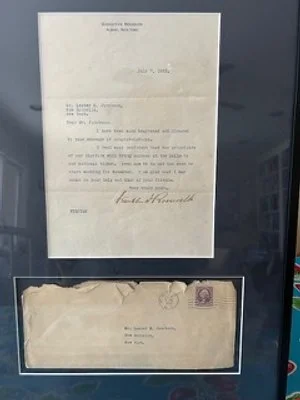Les Jacobson
My father and I didn’t get along all that well, so when he passed away in 1981 I hadn’t entirely reconciled with him. Worse luck for me: his life was fascinating — spanning the era from horse-drawn carriages to lunar landings — and now I wish I knew more about it: about telling his high school principal that he wasn’t fit to be the janitor (and hence not graduating with his class); about teaching George Gershwin to play golf (we were supposedly related through Masha Strunsky, whose daughter Leonore became Mrs. Ira Gershwin); about riveting wings onto B-29 Superfortress bombers at a converted auto plant on the South Side of Chicago during World War II (because as a family man he was exempt from active duty).
I also would’ve asked him about the letter from FDR he received in July 1932, shortly after the Democratic Convention in Chicago. It was sent from the New York Governor’s Mansion and addressed simply to “Lester Jacobson, New Rochelle, N.Y.” but apparently had no trouble finding its way to my father’s home on Mt. Joy Place.
FDR thanked him for his support — “I have been much heartened and pleased by your message of congratulations” — and went on to urge him “to start working for November. I am glad that I may count on your help and that of your friends.” The typewritten letter is signed Franklin D. Roosevelt, and when some years after Dad died I took it to Sotheby’s in New York, an expert there verified it as genuine, and not a stamped signature.
What did he write FDR, and why? Was he astonished and thrilled when he got the response? Did he indeed work for FDR’s campaign that fall?
Perhaps as a result of the FDR connection, he was a longtime New Deal Democrat. So when I turned against the party and the war in Vietnam in the late 1960s, we had a huge falling out. This was the era of the so-called generation gap, and ours was more like a chasm.
One night at dinner he belittled me with his lacerating scorn about my anti-war sentiments, so I walked out. But I returned an hour later to apologize. I had realized during that hour, sitting on a park bench and blubbering my eyes out, that I loved him and needed his love in return. And though he wasn’t given to effusive signs of affection, he showed up at my draft board the night of my interview seeking to become a conscientious objector, as a sign of support (if not enthusiastic endorsement).
Many years later, when I asked my older brother Mark what Dad thought of me, he said, “Oh, you were the apple of his eye.” I was astonished. Had I only known. I would’ve made it a point to learn all about him: about growing up when there was no electricity or indoor plumbing, about the high school principal and Gershwin and the B-29s and FDR’s letter.
